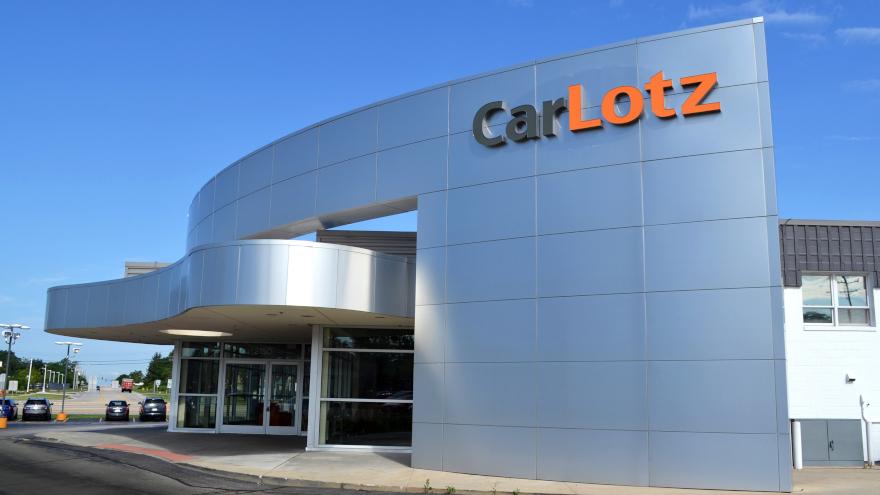Fresh off Inc. honor, CarLotz talks expansion

The new CarLotz location near Chicago. Photo courtesy of company.
By subscribing, you agree to receive communications from Auto Remarketing and our partners in accordance with our Privacy Policy. We may share your information with select partners and sponsors who may contact you about their products and services. You may unsubscribe at any time.
CARY, N.C. –
On the day that Michael Bor found out CarLotz had made this year's Inc. 5000 list, the company was having a team meeting.
So, Bor asked members of his squad where they thought CarLotz had placed.
Somewhere in the 4,000s, they figured.
As it turns out, they were off. By a lot.
CarLotz ranked 460th on the list of fastest-growing private companies, putting them into the top 10th percentile.
Honorees are ranked based on percentage revenue growth between 2014 and 2017.
Subscribe to Auto Remarketing to stay informed and stay ahead.
By subscribing, you agree to receive communications from Auto Remarketing and our partners in accordance with our Privacy Policy. We may share your information with select partners and sponsors who may contact you about their products and services. You may unsubscribe at any time.
“Everyone was very thrilled,” Bor said of his team’s reaction. “We know we’ve been growing fast, and we feel it.
“It’s a lot of fun. It’s a lot of stress,” continued Bor, who is chief executive officer at CarLotz. “But then when you look at that list and see the really impressive businesses that we get listed alongside, it’s really rewarding.”
According to the rankings, the three-year revenue growth for CarLotz was 1,107 percent.
The top five on the list included SwanLeap at No. 1, followed by PopSockets, Home Chef, Velocity Global and DEPCOM Power, respectively.
Some of the folks in the immediate neighborhood of CarLotz on the Inc. list include Cabana Holdings (457) Signs.com (458), California Autism Center (459), TFM Truckload (461), V3Gate (462) and NinjaCat (463), which might qualify for coolest name on the list.
According to a news release, honorees in past years have include Microsoft, Dell, Domino’s Pizza, Pandora, Timberland, LinkedIn, Chobani and Zillow — certainly another nice neighborhood.
Chicagoland expansion
Speaking of neighborhoods, CarLotz just moved into a new one: Chicago.
In mid-July, the used-vehicle consignment and remarketing business announced its seventh store, opening a location — its largest to date — in the Chicago suburb of Downer’s Grove, Ill.
This is also the first location in the Midwest for CarLotz, which launched in 2011 in Virginia and has since spread to North Carolina and Florida.
The facility is approximately 30,000-square-feet and includes space for more than 500 vehicles. A ribbon-cutting is scheduled for Tuesday.
Many of CarLotz’s commercial accounts have already visited the location and began consigning vehicles there this month, Bor said.
“They’ve been thrilled at what they’re seeing,” he said. “It’s definitely the most impressive looking store we have.”
The fact that a few commercial consignors are based nearby was “just a pleasant coincidence” and wasn’t the reason CarLotz opened up in Chicagoland.
However, after CarLotz announced it was setting up shop there, there were two local accounts the company had not previously crossed paths with who came to CarLotz to do business, he said.
As far as how CarLotz actually selects expansion targets, Bor said the company talks with consignors and looks at the overlap of this Venn diagram, so to speak: Where do consignors have high volumes of cars? Where is there an opportunity to improve wholesale results?
In addition to the aforementioned Midwest (thus the launch in Chicago), CarLotz has targeted California, New England and Texas for expansion.
It’s still early days at the Chicago location with a lot of work to do as CarLotz aims to get volumes rolling as soon as possible, Bor said, adding that “the pieces are in place for a very successful store for us.”
Mobility impacts
Beyond geographic expansion, another impact on the CarLotz business is the area of mobility in the overall auto industry.
Based on its business model, CarLotz retails cars in order to get the best money for its consignor customers and pull in more for vehicles than they would sell for at wholesale.
That means they have to act as retailer, be located on the “auto mile” in any given market, set up shop in a nice location and provide a “comfortable” sales environment for consumers.
Among the “ancillary benefits” of its model is that several of its commercial customers work in the consumer-facing space, including working with ride-hailing companies, Bor said.
CarLotz has “several accounts that lease vehicles to Uber and Lyft and companies that service Uber and Lyft,” he said.
“When those vehicles come back or if the Uber or Lyft driver needs to go somewhere and swap out a vehicle or get a service issue taken care of or really handle any kind of vehicle need,” Bor said.
For example, an Uber X driver who has a sedan wants to become an Uber XL driver, meaning they need to get a bigger ride.
“Having a retail location like ours that the driver can come in, drop off their old car, get it sold for whoever’s financing that vehicle for them (and) pick up a new one, we’re finding that it could be an interesting play to use our retail footprint to better service all the different parties that are experimenting in the mobility arena,” he said.


